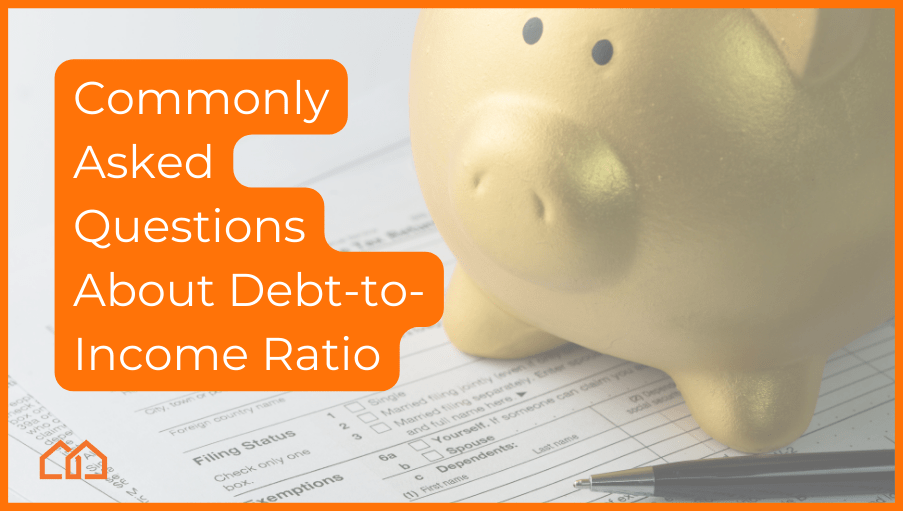If you’re applying for a loan, you may have a lot of questions about debt-to-income ratio. What is it, and why does it matter when you need to buy something big? If you plan to make any significant purchase with financing, then your lender will look at your credit history. Several factors may impact your eligibility, which include:
- Your payment history: On-time payments improve your eligibility.
- Credit usage ratio: the amount of credit used compared to your credit limit. Using less of your available credit looks better on your report.
- Debt-to-income ratio (DTI): The amount of debt you pay compared to your income. The lower the ratio, the better.
- Derogatory marks on credit report: Negative reports like non-payments can hurt your credit.
- Average age of your credit: New credit cards and loans lower your score compared to established credit.
- Total # of accounts: More accounts, whether they are credit cards or loans, lower your score.
- # of credit inquiries: More credit inquiries hurt your credit, so make big purchases strategically.
What is a DTI?
Your debt-to-income (DTI) ratio, which compares your monthly bills and other debts to how much you earn, is often used as a litmus test for financial fitness in tandem with your credit score. Lenders want to see how much your monthly income is already being used to pay debts to determine if you have the potential to pay back a loan. Expenses included in a DTI are:
- Rent or mortgage payments
- Car payments
- Credit card payments
- Student loans
- Child support or alimony payments
- Any other monthly payment arrangements
Lenders classify these expenses as “front-end” or “back-end.” Front-end debts include basic housing, while back end payments pertain to other expenses such as car payments and student loans.
You can calculate your DTI by taking your monthly debts and dividing their total by your pre-tax monthly income. For example, if you have $3,000 in obligatory monthly payments and your pre-tax paycheck is $6,000 a month, 3,000/6,000 is .5, or 50%. Improving your DTI will increase your chances of getting the best interest rates and simplify the loan approval process. But what is a good DTI and how can you improve it?
Q: What is a good debt-to-income ratio?
Although a DTI does not affect your credit score, it’s used as another factor in determining whether you can qualify for a loan. Every lender has different standards for what makes the cut, so it’s important to ask your bank or lender what rate they find favorable. However, for reference, a DTI of 36% is considered the average acceptable ratio. Overall, a lower DTI looks better than a higher one.
Mind Your Top Dollar
You must also consider your potential loan amount and how much margin you have in your monthly budget. For instance, if you have a DTI of 50% and your income is $6,000 a month, you still have roughly $3,000 of margin after your bills. If you need to take out a used car loan for around $300 a month, a lender can certainly work with you. However, if you are interested in buying a second home, it would be difficult to qualify for a second mortgage since the monthly payment could be much larger.
Q: How can you improve your DTI?
Reduce expenses.
The simplest way to improve your debt-to-income ratio is to reduce monthly expenses and pay off debt. Focus on the monthly payments that can be paid off more quickly, which mainly include “back-end” expenses like credit card payments, student loan payments, and car payments.
Pay off small debts first.
If you can pay off these smaller debts, you will gradually increase the gap between your debts and income, lowering your DTI. If paying off several credit cards is difficult, then a debt consolidation program can help reduce your monthly payments to pay everything off.
Don’t take on new debts.
You should also be mindful to not take on new debts. Do not sign up for a new credit card at the retail store around the corner. If you can get by with the same car for another year or two, hang onto it.
Sell off assets you don’t need to pay off debt.
If you have an extra vehicle or watercraft that you don’t use often, you can even sell it and use the proceeds to pay off more debt. Also, if you have a second mortgage on an investment property that you want to release and cash out on, then let us sell your home for top dollar. Our marketing concierge and listing team are second to none and will ensure you get the best deal possible.
Your Next Steps
When you get your finances in order, you can move on to make big moves for your future. Whether you want to increase your margin so you can acquire investment properties or buy your dream home, our real estate team can help you. Contact Marketplace Homes to learn more about our robust real estate solutions.

